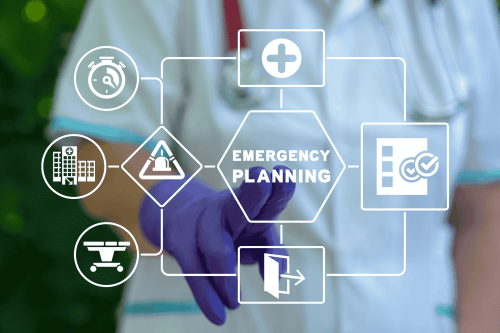Infection control is an important tool for all healthcare professionals. It is defined as the action to prevent or stop the spread of infection. There are many methods to assist in infection control. Overall, it is necessary for healthcare personnel to utilize these methods to create a safe healthcare environment.
Types of Infection Control Precautions
There are two types of precautions within infection control: standard precautions and transmission-based precautions. Standard precautions are are an important part in patient care. These methods are typical practices to prevent infection spread. For instance, washing hands, wearing a mask, and using needles safely are all standard precautions. Therefore, it is important healthcare workers use these precautions as a means of infection control.
On the other hand, transmission-based precautions are additional measures for patients who may already be infectious. These precautions help combat the spread of infection. For example, the use of disposable equipment, limiting patient movement/transport, and additional cleaning are all transmission-based precautions that aid in infection control. If a patient is or might be infectious, these precautions, as well as standard precautions, will help prevent and stop the spread of infection.
Vaccines
Both the flu and COVID-19 are highly infectious illnesses. Therefore, it is important to prevent these infections from spreading as they have the potential to be severe. The flu and the coronavirus have vaccines as a means of prevention. The flu has a wide range of symptoms that can be either mild or severe. More importantly, the flu can be deadly, which is why it is so important to prevent the spread of this dangerous virus. The flu vaccine is the best form of prevention. It is a safe, annual vaccine that aims to protect people from the virus. Above all, it is important people get the flu vaccine every year to reduce the spread of the flu.
The coronavirus is also a contagious virus that can be spread very quickly. Much like the flu, COVID-19 has the potential to be deadly and it is important to control the rate of infection. Although coronavirus vaccines are fairly new, they are both safe and effective. The vaccine helps protect against getting the virus and the severe symptoms associated with the virus. COVID-19 vaccines are working to control the virus and it is an important tool in combating the pandemic.
Infection Control and Blood Borne Pathogens
When working with blood, healthcare personnel can be exposed to blood borne pathogens. These include hepatitis B and C and HIV. These infections may spread if a healthcare worker is cut or stuck with a needle containing an infected patient’s blood. They can also spread if a patient’s blood gets into a worker’s eyes, nose, mouth, or skin. However, there are several preventative measures to control this type of infection. When working with blood, it is important safe techniques are practiced. Disposing of needles properly, wearing gloves, masks, and gowns are all ways to prevent infection. Infection control is extremely important and provides additional safety to healthcare personnel and their patients.
Get Certified
Infection Control Training is important for providers to keep themselves and their patients safe. American Medical Compliance (AMC) is a leader in the industry for compliance, Billing and HR solutions. To become certified, please visit us at: www.americanmedicalcompliance.com.
References:
Centers for Disease Control and Prevention (2016, January 5). Infection Control Basics. Retrieved from https://www.cdc.gov/infectioncontrol/basics/index.html
Centers for Disease Control and Prevention (2021, August 26). Key Facts About Influenza (Flu). Retrieved from https://www.cdc.gov/flu/about/keyfacts.htm
Centers for Disease Control and Prevention (2021, May 10). Ensuring COVID-19 Vaccines Work. Retrieved from https://www.cdc.gov/coronavirus/2019-ncov/vaccines/effectiveness.html
Centers for Disease Control and Prevention (2003, July). Exposure to Blood: What Healthcare Personnel Need to Know. Retrieved from https://www.cdc.gov/hai/pdfs/bbp/exp_to_blood.pdf



